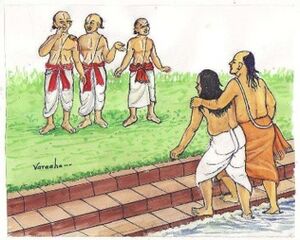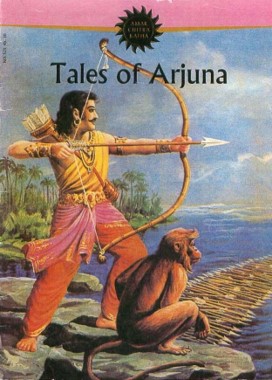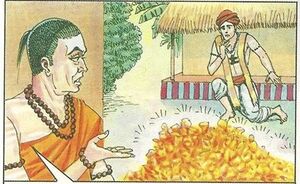Talk:Bhakti, the opposite of Becoming Judgmental and Proud
By Vishal Agarwal
Some practitioners can indulge in judging people and placing them on different scales based on their perception of who’s the best Bhakta, who’s inferior, and so on. More often than not, this imperfect Bhakti Yogī considers himself as more spiritually elevated and more advanced than others and is driven more by a desire to get worldly fame and riches, than attain true devotion.
You do not know Him who created all this Universe; nor that One which is within you. Enrapt on all sides by the mist of ignorance are the hymn-chanters, who move about chanting hymns with egoism and aiming merely at material gains. Ṛgveda 10.82.7
But the essence of Bhakti Yog is to become humble in front of the Bhagavān and others and see the Bhagavān in everyone. The perfected Bhakti Yogī displays humility and considers all as equal–
One should give up self-importance and pride. Nārada Bhakti Sūtra 64 One should not distinguish between people based on birth (caste), learning, physical beauty, family (status or lineage), wealth or occupation because all belong to Bhagavān. Nārada Bhakti Sūtras 72–73
Story: The True Nobility of Dhanurdāsa
When Saint Rāmānuja became old, he needed support to walk. Every morning, he would take a bath in the river Kāverī and then return to the temple, leaning on the shoulders of Dhanurdāsa. This annoyed some of his followers who said, “Dhanurdāsa was a foolish person in the past. Moreover, he is not born into a great family of Brāhmaṇas. Why don’t you lean on the shoulder of one of the more prominent of your disciples?”
Rāmānuja replied, “Knowledge, birth in a great family, and wealth can make one arrogant. Dhanurdāsa does not have any of these three types of arrogance. The Kāverī river’s water can only clean my external body. But the man’s heart and mind can only be cleaned by the touch of a person like Dhanurdāsa, who has no arrogance of wealth, knowledge or birth in an elitist family.”
The following two stories illustrate how pride causes even the greatest Bhakta-s to fall. The first story occurs in the writings of the Āḻvār saints whereas the second is from the Kannada Śaiva traditions. A true Bhakta never becomes proud because he realizes that all of his spiritual or mundane accomplishments are a loving and graceful gift of Bhagavān.
Story: Arjuna and Hanumān meet at Rāmeśvaram
Once, Arjuna went on a pilgrimage with some saints to Rāmeśvaram. There, a Brāhmaṇa explained to him how Bhagavān Rāma had constructed a bridge of stones with the help of the army of Sugrīva to cross over to Laṅkā. Arjuna commented with pride, “Rāma was a great archer like me. Then why did he have to take the help of monkeys? He could have constructed the bridge with his arrows, just like I can!” The Brāhmaṇa felt a bit offended that Arjuna should have insulted Rāma. But he kept quiet and went his way.
A monkey who had been following them said to Arjuna, “You are quite foolish. No bridge of arrows could have sustained the weight of monkeys. It would have collapsed by their weight. If you can construct a stronger bridge, I will become your servant!”
“I will show you how. If I fail, I will immolate myself here and now on a pyre,” said Arjuna. So, he started shooting arrow after arrows and soon, a bridge of arrows appeared on the ocean, extending out from Rāmeśvaram towards Laṅkā!
But as soon as the monkey stepped on the bridge, it collapsed and the monkey fell into the water. So, Arjuna created one bridge after the other, stronger than before, but each time, the bridge would collapse no sooner had the monkey taken a few steps.
To keep his vow, Arjuna piled a heap of logs and set them alight to commit suicide. But just then, a young man appeared and stopped him. When Arjuna told him the whole story, the young man said, “But wait, a promise is not valid if there is no witness. How can you be so sure that it was the weight of the monkey that caused the bridge to collapse? Try once more.”
The monkey agreed and Arjuna constructed one more bridge from his arrows. The monkey started walking on it. But unlike the previous times, the bridge did not collapse! The monkey was none other than Bhagavān Hanumān who could increase his bodily size at will. So, he bloated himself into a giant. But the bridge would still not collapse! Then, Hanumān started jumping on the bridge, but it still stood intact.
Hanumān realized that the young man was none other than Bhagavān Rāma. Arjuna too realized that the young man was none other than Bhagavān Kṛṣṇa. They both prostrated at the young man’s feet, and immediately, he took his real form as four-armed Bhagavān Viṣṇu of whom both Rāma and Kṛṣṇa are Avatāra-s. Viṣṇu said to them, “I came here because Arjuna was being too vain, and because Hanumān was being too proud of his strength. Remember that I am the source of everyone’s strength and success!”
Story: The Pride of Devar Dasimaiyya Brings His Downfall
In the 10th century CE in the Indian state of Karṇāṭaka, there lived a great devotee couple of Śiva by the name Devar Dasimaiyya and his wife Thukkalai Devī (also called Duggale). One day, she procured some spinning yarn of great quality. With prayers to Śiva on his lips, Dasimaiyya wove out a beautiful piece of cloth depicting the scenes from the stories of Śiva. Thukkalai suggested that they should use the cloth for adorning the Mūrti of Śiva in their local Maṇḍir. But Dasimaiyya had other plans, “Let us sell this piece of cloth. We will get a lot of money and this will rid us of our poverty forever.”
Dasimaiyya tried to find a suitable buyer but no one could pay enough to justify the excellent quality of the cloth. Finally one day, he saw a Sādhu who worshipped Śiva passing by and offered the cloth as a gift to him. The Sādhu was overjoyed and in return, he said, “I have only some salt, grains, spices, etc., that I had begged for. Let me give these to you.” Dasimaiyya returned home with the Sādhu’s gifts and his overjoyed wife put these food items in separate jars. The next day, she found that her food jars had miraculously turned ‘never-emptying.’ Whenever she withdrew some quantity of food from the jar, it filled back. The couple realized that it was none other than Śiva who had blessed them for their devotion. They began using the never-emptying food jars to feed devotees of Bhagavān every day.
But after some time, pride entered the mind of Dasimaiyya and he began thinking, “There is no greater giver than Śiva, and there is no greater receiver of his blessings than I.” Śiva then decided to teach him a lesson in humility. There lived another saintly couple, Śaṅkara and his wife with their students. The group toured Maṇḍir-s of Śiva frequently in South India. One day, they passed by the village of Dasimaiyya and stayed close to his home. Dasimaiyya was very impressed by their Bhakti towards Śiva. In the morning, Śaṅkara’s wife asked one of their students to go around the village and beg for alms. Dasimaiyya heard it and remarked to Śaṅkara and his wife with a tone of arrogance, “Why do you want to go around and beg for food? Śiva has chosen me as His special Bhakta and has given me a never-ending supply of food. I can single-handedly take care of all His other Bhakta-s.”
Śaṅkara was taken aback by Dasimaiyya’s arrogance and he replied, “I am glad that you have been blessed by Śiva but it does not behoove you to be arrogant. The same Śiva Who gave you a treasure can also take it back. Prosperity and poverty are all through the grace of Bhagavān alone.” Saying this, he picked some trash from a heap in front of them and flung it in the air. The trash immediately turned into gold nuggets before falling back to the ground! Dasimaiyya was startled and returned home to relate the miracle to his wife and explained how this was a result of his insulting the saint with his pride. She had something else to tell him, “Our pots of food have stopped refilling on their own. Perhaps this is the result of the insult caused to the saint. We should go and apologize to the saint, and also ask Śiva to forgive us.”
The couple returned to Śaṅkara who said, “Remember that all riches in life are the blessings of Bhagavān alone and you can retain them only till you remain humble. When a Bhakta becomes proud and arrogant, Bhagavān Śiva takes back his blessings. But you have realized your mistakes now and have learned the importance of humility in life. Therefore, Śiva will bless you back with sufficient food and resources.” The pots of food in Dasimaiyya and Thukkalai started filling up again and they spent the rest of their lives feeding the Bhakta-s of Bhagavān. Dasimaiyya himself became a great saint in his later stages of life and wrote beautiful poems in praise of Śiva. He spread the worship of Śiva among the wild tribes in the region that lived by hunting. He asked them to give up eating meat and instead earn their livelihood by extracting oil from seeds and selling the same. Under his influence, the local king also became a follower of Bhagavān Śiva.



